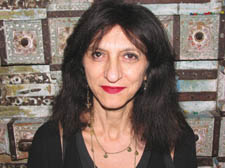|
|
 |
| |
 Lebanon-born Mai Ghousoub went into publishing after moving to London Lebanon-born Mai Ghousoub went into publishing after moving to London |
Camden books | Mai Ghoussoub: Selected Writings | review | Lebanon
After fleeing war, Mai Ghoussoub, ‘Beirut’s Debbie Harry’, gave a voice to Middle Eastern writers, writes Mohammad Al-Urdun
by
Order this book
EVERY once in a while comes someone who embodies the spirit of a place. Mai Ghoussoub was one.
Born in Lebanon in 1952, the doctor apologised to her Christian-Arab father for delivering a girl instead of a boy – a story she never forgot and did her best to live up to.
Anti-establishment, anti-war, ardently feminist and a lover of literature, art, jazz and belly dancing, she became an internationally acclaimed writer, playwright, poet and sculptress.
During the fighting in the early 1970s Mai and friends were kidnapped and brought before PLO leader Yasser Arafat for distributing critical literature.
In the 1975 civil war she and Andre Gaspard set up two medical centres and negotiated the release of hostages.
Later in the war Mai was shot and lost an eye while driving a Palestinian to hospital.
After migrating to London in the 1970s, she used her artistic Midas touch to transform the English literary scene. Mai and Gaspard established Britain’s first publishers of Middle Eastern and world literature, and its first Arabic literature bookshop, Al Saqi in Bayswater. Until then Britain had been, comparatively, a world literature desert.
Their first publishing house, Serpents Tail, was sold, but its successors, Al Saqi and Telegram, built on a policy of an open door to hard-pressed and controversial writers from Kyrgyzstan to Korea, South Africa to Spain.
Mai anticipated post-modernist Arabic literature and dealt with controversial, sometimes explosive books, including a Syrian novel about a fundamentalist who smelled women’s periods, American novels about punk-rocker Muslims, and books about Middle-Eastern lesbians and gays.
She hosted legendary parties at Saqi’s – parties in which Israeli journalists rubbed shoulders with friends of Arafat – and famously took to London’s streets dressed in a Saudi head-to-toe burqa tennis outfit and as an Arab Lolita, to test public reaction.
Mai died last year, aged just 54. Saqi Books has put together an eclectic collection of her writing: essays and poems on “the enigma” of women in the Middle East, Billie Holiday and Janis Joplin; an essay on Arab male identity problems and the alleged Viagra chewing-gum plot in which Israel was accused of trying to render Egyptian men impotent; essays on the War on Terror and nationalism; portraits of her London neighbours, a play about war and art and observations about life in London and Beirut.
Beirut was most special in her heart and her most evocative writing harks back to her experience of war and her commitment to peace – its mix of Middle Eastern, Mediterranean and faded French glory, and her sense that beauty is found in the back streets, in the most unexpected places.
Israel’s 2006 war on Lebanon spurred books, readings and an exhibition celebrating Beirut.
She had in her an essence of Lebanon, in particular Beirut at its most rebellious, before it was plunged into its recent turmoil.
An Arab poet described her as a “daughter of the moment”; a newspaper wrote: “Seeing her around Beirut was like catching sight of Debbie Harry in New York.”
|
 |
|
 |
 |
|
 |
|



